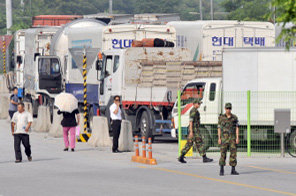Talks on joint Korea project collapse
SEOUL: North and South Korea failed to reach agreement in talks Thursday about the fate of their last major joint business project, amid high cross-border tensions and the North's continuing nuclear standoff with the world.
The two sides could not narrow differences and did not set a date for the next round, Seoul's unification ministry said.
The meeting at the Kaesong joint industrial estate just north of the border lasted just one hour and 10 minutes, far shorter than their last discussions in June.
The South rejected the North's demands for huge wage and rent increases at the Seoul-funded estate. It insisted on the immediate release of a South Korean worker at Kaesong who has been held incommunicado by the North since March 30.
"Our side said in a keynote speech that we cannot accept North Korea's unreasonable demands that it has presented over the joint park after unilaterally scrapping existing contracts," Yonhap news agency quoted a unification ministry official as saying.
Representatives of the 105 South Korean firms at Kaesong say many of them are already close to bankruptcy because of falling orders amid icy cross-border relations.
At the first round of talks last month Pyongyang stunned Seoul by demanding a wage rise for its 40,000 workers to 300 dollars a month from around 75 dollars currently.
It also demanded an increase in rent for the estate to 500 million dollars, compared with the current 16 million dollars for a 50-year contract.
At the second round the North stuck to its financial demands but offered to lift restrictions on border crossings it imposed last December.
On Thursday the South demanded the worker's release and urged the North to stop insulting its president, Lee Myung-Bak, according to unification ministry spokesman Chun Hae-Sung.
"The North repeated its demand that the rent issue must be discussed first and refused to talk about the agenda proposed by our side," Chun said.
Foreign Minister Yu Myung-Hwan said separately Seoul may have to raise the detainee issue at a regional security meeting, the ASEAN Regional Forum, later this month.
Kaesong, which opened in December 2004, is the last operating reconciliation project between communist North and capitalist South.
Its future has become increasingly uncertain as inter-Korean relations have worsened and as the North's nuclear standoff with the world has intensified.
Some analysts believe the North wants to keep the estate going since it now faces tighter curbs on lucrative missile exports, under UN and US sanctions imposed in response to its May 25 nuclear test.
The cash-strapped North received 26 million dollars last year in wage payments at Kaesong.
Others say Pyongyang may be willing to forgo the cash because it fears exposing its workers at Kaesong to a South Korean lifestyle.
"From Pyongyang's point of view, each worker ... was a poster advertising capitalism, damaging the socialist system," said Leonid Petrov, research associate at the Australian National University, in an article this week. The North alleges the South Korean worker slandered its political system and tried to incite a local woman worker to defect. Amnesty International has called for his immediate release.
Cross-border relations have been hostile for the past year, since Seoul's new conservative government rolled back a "sunshine" aid and engagement policy with Pyongyang.






